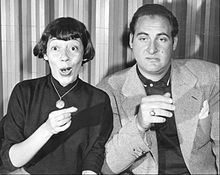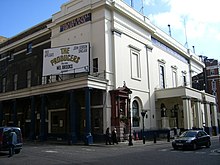Mel Brooks
He then rose to prominence becoming one of the most successful film directors of the 1970s with The Twelve Chairs (1970), Blazing Saddles (1974), Young Frankenstein (1974), Silent Movie (1976), and High Anxiety (1977).
Later Brooks made History of the World, Part I (1981), Spaceballs (1987), Life Stinks (1991), Robin Hood: Men in Tights (1993), and Dracula: Dead and Loving It (1995).
His father's family were German Jews from Danzig (Gdańsk, Poland); his mother was a Ukrainian Jewish immigrant from Kyiv, in the Pale of Settlement of the Russian Empire (present-day Ukraine).
[15] When Brooks was 14 he gained employment as a pool-side tummler (entertainer) at the Butler Lodge,[16] a second-rate Borscht Belt hotel, where he met 18-year-old Sid Caesar.
In a Playboy interview, he explained that one day he stood at the edge of a diving board wearing a derby and a large alpaca overcoat with two suitcases full of rocks, and then announced: "Business is terrible!
[17] Brooks graduated from Eastern District High School in Williamsburg in January 1944[20] and intended to follow his older brother and enroll in Brooklyn College to study psychology.
[23] He made high scores and was sent to the Army Specialized Training Program at the Virginia Military Institute to be taught electrical engineering, horse riding, and saber fighting.
[23] A reporter for the United States Department of Defense writes that Brooks arrived in France in November 1944, and later in Belgium, serving with the 78th Infantry Division as a forward artillery observer.
[30]Stationed in Saarbrücken and Baumholder, the battalion was responsible for clearing booby-trapped buildings and defusing land mines as the Allies advanced into Nazi Germany.
[24] With the end of the war in Europe, Brooks joined the Special Services as a comic touring Army bases and he was made acting corporal, put in charge of entertainment at Wiesbaden,[6][25] and performed at Fort Dix.
[43] Likewise, the film My Favorite Year (1982) is loosely based on Brooks's experiences as a writer on the show including an encounter with the actor Errol Flynn.
"[17] On one of these occasions, Reiner's suggestion concerned a 2000-year-old man who had witnessed the crucifixion of Jesus Christ (who "came in the store but never bought anything"), had been married several hundred times and had "over forty-two thousand children, and not one comes to visit me".
The animated short film The Critic (1963), a satire of arty, esoteric cinema, was conceived by Brooks and directed by Ernest Pintoff.
Peter Sellers personally championed the film, paying out of pocket to take out full page ads in Variety and The New York Times.
Loosely based on Ilf and Petrov's 1928 Russian novel of the same name about greedy materialism in post-revolutionary Russia, it stars Ron Moody, Frank Langella and Dom DeLuise as three men individually searching for a fortune in diamonds hidden in a set of 12 antique chairs.
[17] Brooks then wrote an adaptation of Oliver Goldsmith's She Stoops to Conquer, but was unable to sell the idea to any studio and believed that his career was over.
[17] Blazing Saddles starred Cleavon Little, Gene Wilder, Harvey Korman, Slim Pickens, Madeline Kahn, Alex Karras, and Brooks himself, with cameos by Dom DeLuise and Count Basie.
It won the Writers Guild of America Award for Best Comedy Written Directly for the Screen; and in 2006 it was deemed "culturally, historically or aesthetically significant" by the Library of Congress and selected for preservation in the National Film Registry.
It starred Wilder, Marty Feldman, Peter Boyle, Teri Garr, Madeline Kahn, Cloris Leachman and Kenneth Mars, with Gene Hackman in a cameo role.
Composer John Morris again provided the score, and Universal monsters special effects veteran Kenneth Strickfaden worked on the film.
[64] Silent Movie (1976) was written by Brooks and Clark, and starred Brooks in his first leading role, with Dom DeLuise, Marty Feldman, Sid Caesar, Bernadette Peters, and in cameo roles playing themselves: Paul Newman, Burt Reynolds, James Caan, Liza Minnelli, Anne Bancroft, and the mime Marcel Marceau, who uttered the film's only word of audible dialogue: "Non!"
Starring Brooks, Madeline Kahn, Cloris Leachman, Harvey Korman, Ron Carey, Howard Morris, and Dick Van Patten, it satirizes such Hitchcock films as Vertigo, Spellbound, Psycho, The Birds, North by Northwest, Dial M for Murder and Suspicion.
[17] By 1980, Gene Siskel and Roger Ebert had referred to Mel Brooks and Woody Allen as "the two most successful comedy directors in the world today ... America's two funniest filmmakers".
His 1983 version was directed by Alan Johnson and starred Brooks, Anne Bancroft, Charles Durning, Tim Matheson, Jose Ferrer and Christopher Lloyd.
It starred Bill Pullman, John Candy, Rick Moranis, Daphne Zuniga, Dick Van Patten, Joan Rivers, Dom DeLuise, and Brooks.
The New York Times theatre critic Ben Brantley praised the production writing, "Mr. Brooks has taken what could have been overblown camp into a far warmer realm in which affection always outweighs irony.
It led to a 2005 big-screen version of the Broadway adaptation/remake with Lane, Broderick, Gary Beach, and Roger Bart reprising their stage roles, and new cast members Uma Thurman and Will Ferrell.
In early April 2006, Brooks began composing the score to a Broadway musical adaptation of Young Frankenstein, which he says is "perhaps the best movie [he] ever made".
[71] On October 18, 2021, it was announced that Brooks would write and produce History of the World, Part II, a follow-up TV series on Hulu to his 1981 movie.
[92][93] In 2010, Brooks credited Bancroft as "the guiding force" behind his involvement in developing The Producers and Young Frankenstein for the musical theater, saying of an early meeting with her: "From that day, until her death ... we were glued together.










